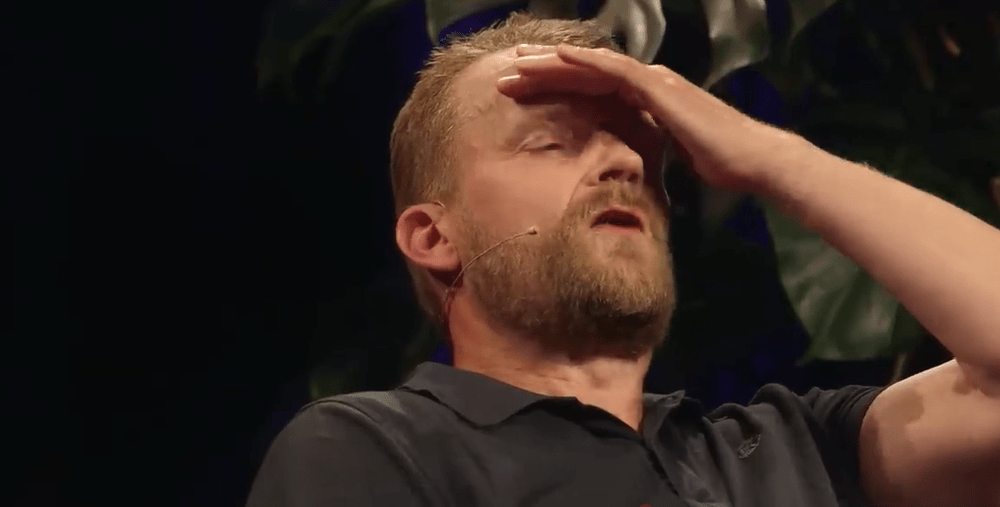Frank Hvam had a very unique early career, particularly for someone who is now known as a comedian in Denmark. Growing up on his family’s farm with dogs and ducks, he first pursued veterinary studies because he loved animals. But he had a flash of insight halfway through a particularly unpleasant procedure involving a dog. As he subsequently explained, that one moment changed everything. After graduating from veterinary school, he entered the unpredictable but ultimately fulfilling field of comedy.
Frank started doing stand-up on small stages all over Copenhagen by 1995, and he finally found his voice in a combination of blatantly awkward humor and dry wit. Before starting his own show, Alt under kontrol, he was writing for Danish TV2’s satirical program, “Ugen der gak.” He was notable for his habit of leaning into discomfort rather than away from it, which was especially advantageous in a culture that values subtle expressiveness.
When he teamed up with Casper Christensen, his career took a dramatic turn. Together, they produced the sketch show Casper & Mandrilaftalen, which was both structurally radical and utterly ridiculous. It pushed the limits of Danish television comedy and introduced characters like Gentleman Finn, a cannibal who is unnervingly endearing. The dynamic between them and Steve Coogan and Rob Brydon was remarkably similar: equal parts chaotic and shrewdly self-aware.
Frank Hvam – Biographical and Professional Overview
| Full Name | Frank Hvam Nielsen |
|---|---|
| Professional Name | Frank Hvam |
| Date of Birth | September 12, 1970 |
| Place of Birth | Ørum Sønderlyng, Denmark |
| Nationality | Danish |
| Height | 1.85 m |
| Spouse | Anja Farsig (married in 2014) |
| Education | Royal Veterinary and Agricultural University (dropped out) |
| Profession | Comedian, Actor, Writer, Producer |
| Famous Roles | Frank in Klovn, Kenny in Langt fra Las Vegas |
| Known For | Klovn, Casper & Mandrilaftalen, Game of Thrones |
| Official IMDb | Frank Hvam IMDb |

The pair’s most popular work, Klovn, a mockumentary-style television series featuring fictionalized versions of themselves, was produced in 2005. Klovn made Hvam a national celebrity over the course of 75 episodes and several movies. Uncomfortable silences, emotional awkwardness, and situations that most people would prefer to forget were all major components of the humor, which was always on the edge. But the genius was there. Hvam created a style of comedy that felt remarkably effective in its honesty by exposing the audience to their own social faux pas.
In Klovn, “Frank” is constantly overpowered, uncertain, and excruciatingly sincere. He is so relatable because of his flawed humanity. Hvam was crafting an emotional slow-burn, where the laughter frequently followed the cringe, while others were aiming for punchlines. By doing this, he impacted a whole generation of Danish comics, many of whom now imitate his storytelling style, which is emotionally unvarnished.
He shocked even his most devoted followers in 2016 by making a brief but noteworthy cameo as a Citadel maester in Game of Thrones. Despite being brief, this cameo served as a symbolic crossover, showcasing Hvam’s versatility as a performer and introducing his style to a global audience. It demonstrated how Danish humor, despite its uniqueness, could still have a global appeal when based on themes that are relatable to all people.
Hvam made a comeback to the stage in 2024 with the Nobody stand-up special. The show demonstrated a noticeable change—less chaos, more introspection—performed on a smaller, more intimate set. Still humorous, but with a hint of wisdom. He gave an exceptionally unvarnished glimpse into the inner workings of his public persona by speaking openly about identity, relationships, and self-doubt. Nobody felt, to many devoted fans, like the result of years of painstakingly crafting not just jokes but meaning.
Frank Hvam’s thematic choices have been remarkably consistent throughout his career. He deftly examines vulnerability both on stage and on screen. He understands his characters and doesn’t make fun of them. He also gives audiences a better understanding of themselves by doing this. What sets him apart from more traditional performers is this degree of empathy, which is frequently disguised as humor.
The tradition of social restraint is questioned in Hvam’s work within Danish culture. His humor reveals what many would rather keep hidden: the poorly timed comment, the tentative compliment, the unsuccessful apology. Even though they are uncomfortable, these moments are remarkably accurate reflections of reality. That Klovn is still as relevant today as it was twenty years ago is not surprising. Its themes of forgiveness, failure, and friendship have held up surprisingly well over time.
Hvam’s artistic discipline is demonstrated by his ability to stay up to date while maintaining his integrity. He has maintained his relevance in a field that frequently overlooks its veterans by working with seasoned creative partners and consistently changing his tone. Hvam provides substance—crafted, thoughtful, and profoundly human—at a time when younger comedians strive for virality.
His journey is especially motivating for upcoming artists in Denmark and elsewhere. He gave up a career in veterinary medicine because he was aware of a misalignment, not because he was careless. Curiosity and self-awareness drove that daring change, which shaped a career that still inspires and resonates today. His accomplishments demonstrate how authenticity can be a very dependable compass and legacy when it is pursued with conviction.

